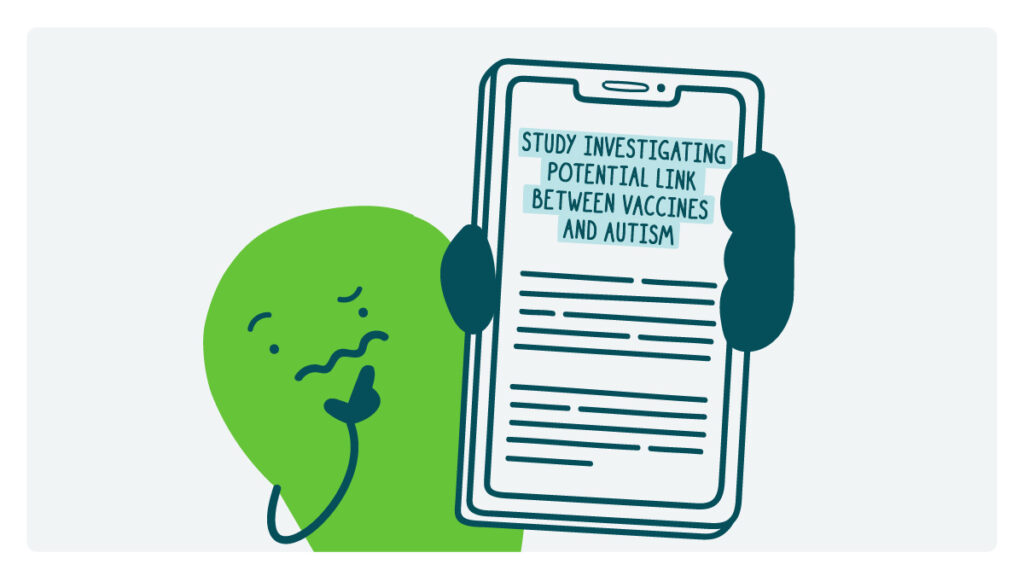
A few weeks ago, CDC announced plans to study whether vaccines cause autism. This theory isn’t new — in fact, it’s contributed to vaccine hesitancy for decades. Back in the 90s, gastroenterologist Andrew Wakefield published a fundamentally flawed study linking autism to the measles-mumps-rubella (MMR) vaccine. In the decades since, researchers have identified a complex web of potential causes of autism — and hundreds of rigorous studies have shown no link between autism and vaccines.
Here at We ❤️ Health Literacy HQ, we’ve shared plenty of tips and resources to help health communicators address mis- and disinformation. But during Autism Acceptance and Awareness Month, we want to focus on how this particular myth has harmed autistic people and their families — and what health communicators can do to help.
Wakefield’s infamous study was published at a time when autism diagnoses were on the rise, and the idea of an “autism epidemic” took shape. It’s understandable that many people wanted to identify a cause for autism — especially parents and caregivers of autistic children, who faced (and continue to face) many challenges. But the epidemic narrative reinforced stigma and ignored some important facts. As our understanding of autism has grown, diagnostic criteria have evolved, which makes it hard to compare autism rates across time. What is clear is that autistic women, transgender and nonbinary people, and people of color have historically been underdiagnosed, but that diagnostic gap is narrowing as more people get access to autism assessment. And as autistic people from underrepresented communities share their stories, they’re shifting cultural narratives about what autism looks like.
From this perspective, an increase in autism diagnoses is a good thing, because it means more people can access resources, support, and community. But the anti-vaccine movement continues to use autism as a bogeyman to cultivate fear and skepticism. The ableist implication is that it’s better for a child to risk catching a vaccine-preventable, potentially deadly disease than to be autistic.
In addition to promoting vaccine hesitancy, which can lead to devastating consequences like the recent measles outbreaks, this narrative has inspired dangerous pseudoscientific products that claim to treat or cure autism. It also echoes harmful messages many autistic people receive throughout their lives — that their natural ways of thinking, communicating, and moving through the world are undesirable or “less than.”
Looking at the big picture, the conversation about vaccines and autism takes attention away from systemic issues that disproportionately affect autistic people, like housing insecurity, unemployment, and discrimination in health care. And some advocates argue that time and money could be better spent on helping autistic people live healthier lives. By leading with empathy for autistic people and parents and caregivers who are impacted by stigmatizing anti-vaccine messages, health communicators can help change the narrative. Here are a few ways to start:
- Avoid “autism epidemic” messaging. If you’re writing about the prevalence of autism, present the numbers without value judgments.
- Speak up about harmful policy decisions. For example, many autistic people and their families will lose critical support with the elimination of the Administration for Community Living (ACL).
- Take a strengths-based perspective. To counter stigmatizing messages, highlight strengths while acknowledging challenges that autistic people experience.
- Support curiosity. If parents and caregivers have questions about autism and vaccines, encourage them to talk to their child’s doctor. You can also invite them to…
- Learn from autistic adults with different perspectives and experiences — and amplify their work! We ❤️ how organizations like the Autistic Women & Nonbinary Network and Learn Play Thrive center autistic lived experience and expertise.
The bottom line: The discredited idea of a connection between autism and vaccines is making headlines again, but health communicators can help change the narrative.
Copy/paste to share on social (and tag us!): Challenge stigmatizing messages about autism and #vaccines with tips from CommunicateHealth: https://communicatehealth.com/wehearthealthliteracy/health-comm-for-the-current-moment-changing-the-narrative-about-vaccines-and-autism #HealthComm #HealthCommunication
Browse recent posts